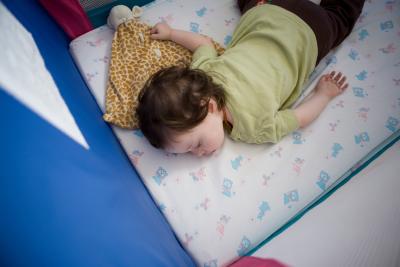A toddler’s sleep problems may not necessarily be due to a physiological disorder. In fact, a child is more likely to have a difficult time sleeping when a regular bedtime routine is not followed. Many infants and young toddlers simply need time to develop a good sleeping pattern. Because toddlers continue to spend more time in light REM sleep than older children, they tend to wake more often through the night.
Types
Although there are dozens of sleep disorders that can affect children, some types are more common in toddlers. Young children often experience night terrors in which case a child can be partially aroused from sleep and sit up in bed crying, screaming or acting terrified.
Obstructive Sleep Apnea Syndrome (OSA) is a condition in which a child’s breathing is obstructed several times during sleep. Children who have this disorder are often extremely sleepy during the day. Talk to your child’s pediatrician if you suspect sleep apnea is the problem. It may be necessary to have your child’s tonsils or adenoids removed. Failure to grow, frequent upper respiratory infections and developmental problems are other symptoms associated with childhood sleep apnea.
Rhythmic movement disorder (RMD) is common in healthy infants and toddlers. A child may roll his head back and forth, rock his body or repeatedly bang his head down into the pillow or against the headboard of the bed. Most times, episodes occur when a child is almost asleep, but it can happen at any time during the night. The American Academy of Sleep Medicine points out that the symptoms of RMD typically disappear by the time a child is 2 or 3 years old.
Symptoms
Symptoms of sleep disorders can vary, depending on the type of sleep disorder a child has. Dr. Jodi Mindell, associate director of the Sleep Disorders Center at the Children’s Hospital of Philadelphia, suggests that parents look for symptoms, such as snoring, choking during the night, night terrors, restlessness or irregular and noisy breathing. Mindell, author of “Sleeping Through the Night,” points out that while many toddlers can have trouble sleeping, fewer than 10 percent actually have a sleep disorder. First children, male children and children who suffer frequent ear infections are more likely to have problems that interfere with sleep.
Diagnosis
Consult with your child’s pediatrician if you think her sleep problems are actually caused by a sleep disorder. Your doctor may refer your child to a sleep specialist who will conduct a sleep study. Monitoring your child’s sleep overnight can help the doctor determine whether your child is suffering from a physiological disorder. The doctor will initially take information about your child’s medical history. Point out any problems you’ve noticed when your child is sleeping to help the doctor diagnose if there is a medical problem.
Treatment
Different kinds of sleep disorders in children involve different methods of treatment. Some sleep disorders don’t require any treatment as long as they are not causing other problems for the child. Medication generally is not used to treat sleep disorders in children unless necessary. Many children eventually outgrow sleep disorders, such as sleepwalking and night terrors. Sometimes, setting a better bedtime routine can help reduce a child’s anxiety and stress helping him to sleep better. If your child has apnea caused by enlarged adenoids or tonsils, your doctor will probably recommend that they be removed.
Causes
While some sleep disorders in children are caused by physical conditions, others result from disturbances in natural sleep patterns. Sometimes, children experience what is known as behavioral insomnia. In this case, a child would stay up until quite late if allowed. Because some children have difficulty going to sleep, parents must help by enforcing a reasonable bedtime.





